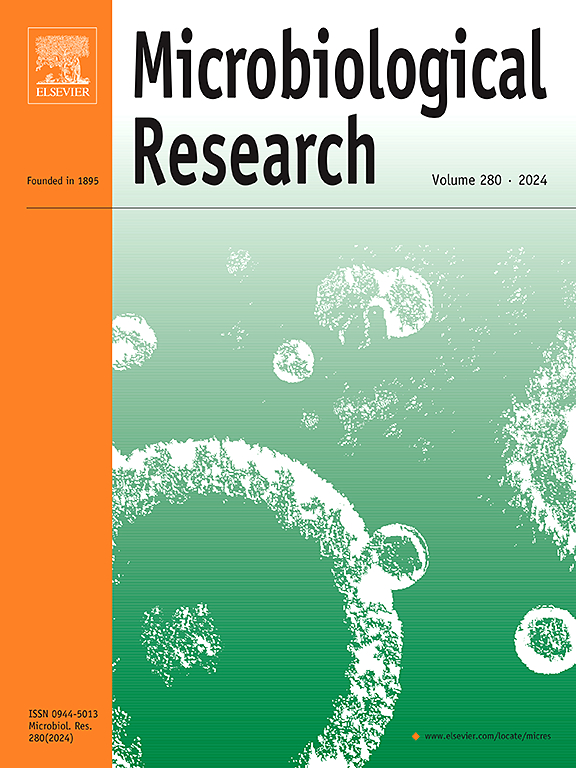一种韧皮部限制的不可培养细菌在昆虫媒介中引起轻度的异种噬噬,以持续感染
IF 6.9
1区 生物学
Q1 MICROBIOLOGY
引用次数: 0
摘要
噬菌是一种重要的抗菌防御机制,许多生物都利用它来吞噬细胞内的病原体。然而,人们对虫媒植物细菌引发的噬菌机制还不甚了解。黄龙病是由亚洲自由杆菌(CLas)引起的,对柑橘生产构成严重威胁。CLas 是一种韧皮部局限性不可培养的细菌,在自然界中由亚洲柑橘象皮虫以持久和繁殖的方式传播。在这里,我们发现,CLas 在烟粉虱肠道中的感染会引发温和的抗菌噬菌作用。噬菌限制了CLas的过度繁殖,以维持牛皮纸壳虫的生存,因为CLas的过量繁殖对牛皮纸壳虫的生命不利。此外,CLas的外膜β-桶蛋白(OMBB)是诱导牛皮蝇噬菌的关键分泌蛋白,它与ATG8和ATG14相互作用。OMBB 可独立诱导牛皮纸虫和非宿主细胞的自噬。这些结果共同揭示了虫媒植物细菌激活温和的自噬作用以控制其繁殖,从而实现对昆虫媒介的持续感染。本文章由计算机程序翻译,如有差异,请以英文原文为准。
A phloem-limited unculturable bacterium induces mild xenophagy in insect vectors for persistent infection
Xenophagy is an important antibacterial defense mechanism that many organisms use to engulf intracellular pathogens. However, the mechanisms of xenophagy triggered by insect-borne plant bacteria are not well understood. Candidatus Liberibacter asiaticus (CLas) causes Huanglongbing, which poses a serious threat to citrus production. CLas is a phloem-limited unculturable bacterium that is transmitted by the Asian citrus psyllid in a persistent and propagative manner in nature. Here, we found that CLas infection in the gut of psyllids triggered a mild and anti-bacterial xenophagy. Xenophagy limited excessive propagation of CLas to maintain psyllid survival, because overload of CLas was detrimental to psyllid life. Furthermore, the outer membrane β-barrel protein (OMBB) of CLas is the key secreted protein that induces xenophagy in psyllids by interacting with ATG8 and ATG14. OMBB can independently induce autophagy in psyllid and non-host cells. Together, these results revealed that an insect-borne plant bacterium activates mild xenophagy to control its propagation, thereby achieving persistent infection in insect vectors.
求助全文
通过发布文献求助,成功后即可免费获取论文全文。
去求助
来源期刊

Microbiological research
生物-微生物学
CiteScore
10.90
自引率
6.00%
发文量
249
审稿时长
29 days
期刊介绍:
Microbiological Research is devoted to publishing reports on prokaryotic and eukaryotic microorganisms such as yeasts, fungi, bacteria, archaea, and protozoa. Research on interactions between pathogenic microorganisms and their environment or hosts are also covered.
 求助内容:
求助内容: 应助结果提醒方式:
应助结果提醒方式:


